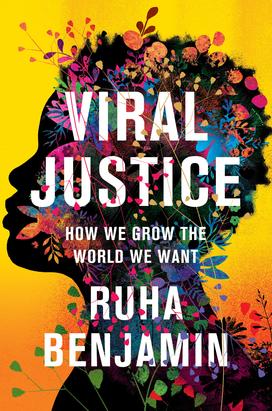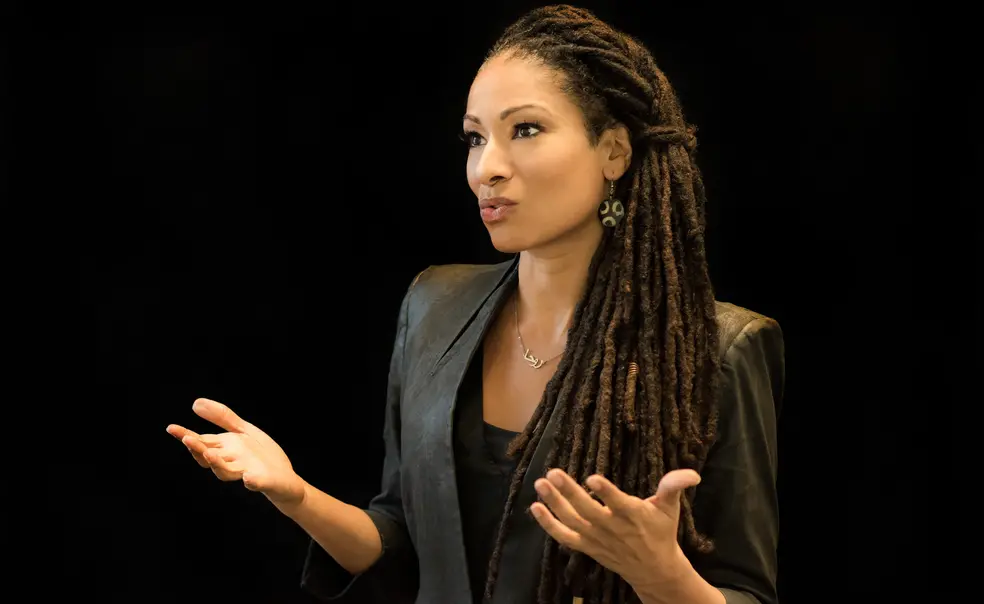Professor Ruha Benjamin Makes the Case for Small Positive Choices for the Greatest Impact in New Book
The book: In her latest book which is part memoir and part manifesto, Ruha Benjamin explores how we can transform society through the choices we make every day. Although this has been a topic of interest for Benjamin for years, the pandemic inspired her to rethink the value of small actions. Viral Justice: How We Grow the World We Want (Princeton University Press) does just this, as she walks through examples of the impacts minor decisions have had and how these actions can spread virally to have an exponentially positive impact. Viral Justice ultimately offers hope to encourage and inspire us all to build a world with more joy.

The author: Ruha Benjamin is a professor in Princeton’s Department of African American Studies. She specializes in the interdisciplinary study of science, medicine, and technology. She is the author of various books including Race After Technology and People’s Science. She received her bachelor’s in sociology and anthropology from Spelman College, and her master’s and Ph.D. in sociology from U.C. Berkeley.
Excerpt
Viral Justice grows out of my contention that viruses are not our ultimate foe. In the same way that COVID-19 kills, so too ableism, racism, sexism, classism, and colonialism work to eliminate unwanted people. Ours is a eugenicist society: from the funding of school districts to the triaging of patients, “privilege” is a euphemism for tyranny. Any attempt at spreading justice, then, entails not simply “including” those who’ve been disposed of but fundamentally transforming the societies into which they’re included.
In the words of James Baldwin, “We are living in a world in which everybody and everything is interdependent.” It is not something we must strive to be. We are. Opposing everyday eugenics requires that we acknowledge and foster a deep-rooted interdependence, not as some cheery platitude but as a guiding ethos for regenerating life on this planet. This is what disability justice organizers have been trying to tell us, and what Indigenous peoples have long asserted—that whether we want to accept it or not, we are connected, not just to other living things but to those yet born. Our decisions today ripple across time ….. seven generations, according to the Haudenosaunee Confederacy’s Great Law of Peace. Interdependence is not only part of a sacred philosophy but also a guiding ethos for refashioning social and political structures.
Consider what began with mass protests over social and environmental injustices in Chile in 2019, where Indigenous communities led the charge for a nationwide “reinvention.” Hundreds of thousands of Chileans mobilized, and in late 2021, they elected 155 representatives to completely rewrite their dictatorship-era constitution amid a “climate and ecological emergency.” An Indigenous language and literature professor, Eliza Loncon Antileo, a member of the Mapuche community, was elected president of the constitutional convention. She and the other participants posed fundamental questions that citizens of most nations have probably never considered: “Should the country retain a presidential system? Should nature have rights? How about future generations?” This is world-building on a grand scale with local communities and Indigenous values guiding the process. It is a process of reworlding that doesn’t try to smother differences, one that envisions a “pluriverse” rather than a universe, welcoming heterogeneity rather than enforcing a singularity.
A professor of Africana studies Greg Carr tweeted at the time, “The fight to rewrite Chile’s national constitution should be leading global conversations & everyday talk alike. The people have forced a social structure confrontation, with structural inequities and our planetary environmental emergency at the center. We should all be watching.” Watching, yes, and asking how we might rewrite our own constitutions; how we might even reconstitute the outworn political imagination that carved up the planet into nation-states to begin with, and refashion the failed economic ideology that treats the earth like one giant mine despite our collective demise.
Alas, it is not my mission in this book to answer these questions exactly but, rather, to remind each of us that they can and should be asked at all. As you’ll see, while many of the examples to follow tend to come from the North American context, this is not because we, here, have any business holding ourselves up as examples to the rest of the world. Instead, in seeking examples of viral justice, I turned mostly to people and projects in my own backyard, as I encourage each of us to start right where we are. But make no mistake—individuals, communities, and movements across the planet, like what we witnessed in Chile, are lighting the way. They remind us that even things that seem hardened in stone can be shed, should be shed, when they run counter to human and ecological interdependence.
Racism, inequality, and indifference are a juvenile rebellion against the reality of this interconnection, microscopically and sociopolitically. “I want to grow up and so should you,” exclaimed an exasperated Baldwin, addressing an audience at the National Press Club on December 10, 1986, a year before he died. Perhaps, then, COVID-19 is forcing us all to grow up, exposing that vulnerability and interdependence are our lot, whether we like it or not.
COVID-19 is a social disease and, as sociologist Eric Klinenberg insists, solidarity is an “essential tool for combatting infectious disease and other collective threats. Solidarity motivates us to promote public health, not just our own personal security.” But, he cautions, “It’s an open question whether Americans have enough social solidarity to save off the worst possibilities of the coronavirus pandemic.” Vaccines, in turn, are no magical fix for the kind of pathological self-interest that masquerades as independence. When we look worldwide, access to a COVID-19 vaccine has widened the gap between those whose lives matter and those deemed disposable. But we don’t have to resign ourselves to this infantile individualism-cum-vaccine nationalism.
What if, instead, we reimagined virality as something we might learn from? What if the virus is not something simply to be feared and eliminated, but a microscopic model of what it could look like to spread justice and joy in small but perceptible ways? Little by Little, day by day, starting in our own backyards, let’s identify our plots, get to the root cause of what’s ailing us, accept our interconnectedness, and finally grow the fuck up.
To that end, I propose a microvision of social change, much like Grandma White’s everyday abolitionism, which we seed in the present as alternatives to our fracturing system. But where should we start? Sleep deprived, let’s start with our dreams.
Excerpted from Viral Justice: How We Grow the World We Want by Ruha Benjamin. Used by permission of the publisher Princeton University Press. All rights reserved.
Reviews
“Heartbreaking, inspiring, and hopeful. . . .Benjamin’s approach is undoubtedly radical.” —James M. Jones, Science
“There’s no one better to light the way out and guide us in building a just future than Ruha Benjamin.” —Karla J. Strand, Ms. Magazine
“A book as urgent as the moment that produced it.” — Jelani Cobb, Columbia Journalism School












No responses yet